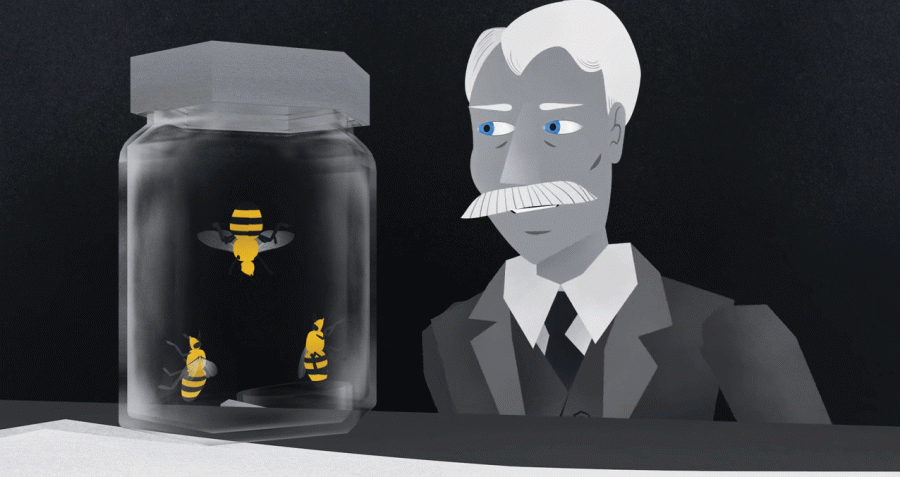Kurt Vonnegut’s Works Live On Posthumously
November 11, 2017 would have been Kurt Vonnegut’s 95th birthday. He passed away in 2007 due to brain injuries from a fall. In the years since his death, several posthumous works have been published including Armageddon in Retrospect in 2008 and While Mortals Sleep in 2011. Although about half of Vonnegut’s work was short fiction, Vonnegut is most well known for his 14 novels, including his critically-acclaimed Slaughterhouse-Five, The Sirens of Titan, Cat’s Cradle and Breakfast of Champions.
In the October 2017 issue of The Atlantic a newly discovered short story by Kurt Vonnegut was published for the first time. The story, “The Drone King,” was written in the early 1950s, before the release of Vonnegut’s first novel, Player Piano. Vonnegut’s friend Dan Wakefield and scholar Jerome Klinkowitz discovered this story, among four others, while working on the first comprehensive volume of Vonnegut’s short stories.
“The Drone King” humorously uses male bees as a communication service. For those unfamiliar with Vonnegut’s distinctive style, his stories are often filled with clever plots, black comedy, science fiction and humanism. In “The Drone King,” the narrator and the eccentric Sheldon Quick discuss an unorthodox and possibly lucrative business proposal. Instead of male drone bees simply dying following their small role in the hive, Quick wants to use the bees to deliver messages.
“For millions of years now, nature has been throwing away, like so much garbage, one of her wisest, gentlest, most beautiful creations – the drone, whose only crime is that he does not make honey,” Quick says.
The story cleverly combines fun sci-fi, the irony of business’ exploitation, the evolving world of communications and an allusion to the first telegraph message. The Atlantic animated a 4-minute long short-film that incorporates some elements of the story. Additionally, they provided
an audio version of the story which runs just under 30 minutes.
“The Drone King” can also be found alongside Vonnegut’s four other newly discovered stories as well as 93 other short stories in Collected Stories. The collection was edited and introduced by Wakefield and Klinkowitz, with a foreword by Dave Eggers. In the foreword, Dave Eggers writes that “The moral story is gone …Writers do not feel inclined to tell their fellow human beings how to live. Most of the stories in this collection are moral stories. They tell us what’s right and what’s wrong, and they tell us how to live.” For example, in “God Bless You Mr. Rosewater,” the protagonist Eliot Rosewater sums up how we should live by saying, “God damn it, you’ve got to be kind.” Collected Stories is broken down into eight thematic sections that span a time period from 1941 to 2007. The 944-page collection is an impressive volume of every Vonnegut short story. It serves as a companion to Kurt Vonnegut: The Complete Novels: The Library of America Collection.
Vonnegut’s writing is an essential part of America’s literary canon. Vonnegut was not only a voice for his generation, but also a voice for humanity. His work transcended genres and style. His influence on the literary world cannot be forgotten. Vonnegut reminded us of who we are and who we can be, writing that “We are what we pretend to be, so we must be careful about what we pretend to be.”
Although Collected Stories offers access to every Vonnegut piece, it is not practical for everyone. Shorter volumes like “Welcome to the Monkey House” are more accessible and will give readers an introduction to Vonnegut’s style. For the new Vonnegut reader, “The Drone King” is a fun place to begin. Alternatives are classics like “Unready to Wear,” “Harrison Bergeron,” “Long Walk to Forever,” and “Miss Temptation.” For Vonnegut enthusiasts, if Collected Works is too ambitious, Look at the Birdie: Unpublished Short Fiction is for you.
No matter if you’ve never read Vonnegut or if you’ve read almost all of his work, take some time to read something new or revisit the classics. “I urge you to please notice when you are happy,” Vonnegut once wrote, “and exclaim or murmur or think at some point, ‘If this isn’t nice, I don’t know what is.’”
Contact Tristan Niskanen at tniskanen@colgate.edu.






